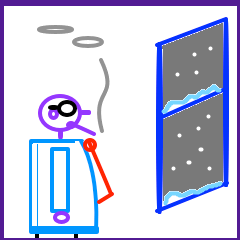Keeping his huge hand on Milford's small shoulder, Mr. Whitman signaled to the bartender with a finger of his other hand, which was also huge.
"Hey, Bret!" he shouted, boomed, declaimed. "When you get time."
"Yeah, I see you, Walt," called the bartender, who was shaking a cocktail in a shaker.
"When you get time," repeated Walt.
"When I get time," yelled the bartender.
Mr. Whitman leaned down and whispered in a voice like a hot scotch-redolent sirocco in Milford's ear.
"Bret's had a bee in his bonnet about me ever since I told him I thought his western tales had an undeniable homoerotic flavor to them."
Milford didn't care, but he didn't say so.
Instead he said, if one can be said to say the sound he made, "Um."
"This is the problem with writers," said Walt, no longer pretending to whisper, "they're so fucking sensitive. Oh, sorry, Miss Lou."
"What?" said Miss Alcott, who had been turned again toward the minstrel band and the dancers.
"Just said I'm sorry," said Mr. Whitman.
"For what?"
"I said a bad word in your presence."
"There are no bad words."
"Not even the F-word?"
"Not even that word," said Miss Alcott.
"Interesting," said Mr. Whitman. He finally took his heavy hand off of Milford's shoulder, and Milford felt that side of his torso rising up to the level of the other side, as if a great weight had been lifted from it. Which, he thought, is what had happened. "Now, tell me, dear Lou," said Mr. Whitman, "what are your thoughts on the C-word?"
Miss Alcott had turned toward the music and dancing again, and now she swiveled back around on her stool to look at Mr. Whitman, who was bringing his pipe out of the pocket of his workman's brown chore coat.
"What did you say?" she said.
"I asked you about the C-word," said Mr. Whitman.
"What about it?"
"Do you mind it being used in your company?"
From another pocket he took out a thick leather pouch.
"Are you deliberately trying to get on my last nerve, Walt?"
"Why, no," said Walt. He opened the pouch with thumb and finger and pinched out a big lump of something that looked like pigeon dung and stuffed it into the bowl of his pipe. "Just curious as to whether there are limits to what words you deem acceptable in mixed company."
"I deem no words unacceptable, be they in mixed or unmixed company."
"So you're giving me a free hand here."
"I'll give you a free back of my hand in about one second," she said.
Before a fight could break out, Bret the bartender was there.
"What do you want, Walt?"
"Ah, my good friend Bret!" boomed Mr. Whitman. He had put his leather pouch away and taken out a box of Blue Tip kitchen matches. "First off, and on my tab, another round of whatever my two friends here are drinking. What've you got there, Murphy, a grog?"
"My name's Milford," said Milford, "and I'm drinking a sarsaparilla."
"Sarsaparilla."
"Yes," said Milford. "And before you say anything, I'm pretty sure I told you before, I am an alcoholic, and so I don't drink alcohol."
"But I've seen you drink alcohol. I just saw you drink a grog back in the front bar."
"That was a mistake. I was confused, because of those mushrooms I ate, and the marijuana I smoked, not to mention that stuff in your pipe that you made me smoke."
"That "stuff' as you call it is, as I believe I told you, a blend of most excellent Kentucky burley and the finest Lebanese hashish, and it doesn't come cheap, and also I don't remember twisting your arm and forcing you to smoke it."
"I only smoked it because I was afraid you would beat me up if I didn't."
"I was only trying to be friendly."
"I'm sure you were," said Milford, although he was sure of no such thing, "but, nevertheless, um –"
"Yes?" said Walt.
"I've lost my train of thought."
"Happens to me all the time."
"Walt," said the bartender, "I'm busy. What do you want to drink."
"Oh, sorry, Bret," said Mr. Whitman. He lighted up his pipe with a kitchen match. The bartender looked annoyed, but he waited for Mr. Whitman to finish puffing. He exhaled an enormous cloud of thick musky smoke, and then said. "A nice hot grog for me. And whatever 'lady drink' Miss Lou is drinking, and another grog for my young friend Malone here."
"He was drinking sarsaparilla," said Bret.
"Give him a grog," said Mr. Whitman.
"I don't want a grog," said Milford. "Also my name is not Malone."
"Two grogs, and a lady drink for Miss Lou," said Mr. Whitman.
"Coming right up," said Bret.
Mr. Whitman turned again to Milford.
"You don't happen to have any more of those mushrooms on you, do you? The sacred mushrooms of the noble red man?"
"No."
"I wish I had some of those."
"Well, I'm sorry, I don't have any."
"Are you still feeling them?"
"I think they're wearing off, I hope they are, anyway."
"Here, take a toke of this."
He offered the pipe to Milford.
"No thanks," said Milford. "As you can see I'm smoking a cigarette."
Mr. Whitman cast a cold eye on the pack of Husky Boys on the bar, and touched it with a finger.
"Those things will kill you, son."
"Sooner rather than later, I hope," said Milford.
"Spoken like a true poète maudit! But here's the thing about this stuff," said Mr. Whitman, raising up his pipe in an admiring sort of way. "It induces the dreams from which we extract poetry. A few bowls of this mixture, and I can knock out twenty pages of immortal verse as easy as falling off a log. Come on, take a hit, it's not going to kill you."
"If I 'take a hit', will you stop pestering me?"
"I promise."
"Good, give me that pipe."
Milford took the pipe and drew deep. What did it matter?
At least it wasn't alcohol, and he had to admit, there was something soothing about the smoke, something that seemed to flush away his worries, his fears, his awareness even of his own self. Mr. Whitman, smiling somewhere within his thick brindled beard, took out his box of kitchen matches again, struck one and held the flame to the bowl of the pipe as Milford continued to draw and puff.
"There you go, my lad," said the big man, who now seemed even bigger, "suck deep, my friend, deep within your lungs, but try to hold it in longer before exhaling, as long as you can."
Milford did as he was enjoined to do.
The music played, the dancers danced.
At last Milford drew upon the pipe but nothing but stale air came through the mouthpiece.
"It's kicked," said Mr. Whitman, and he took the pipe. "How do you feel?"
"Um," said Milford, because that was all he was able to say.
"Take a drink of that grog now," said Milford.
There was a metal tankard sitting there, steam floating up from the liquid in it. Milford took up the tankard and drank.
Suddenly he heard a familiar voice.
"Now don't you feel better?" said Stoney, Milford's alter ego, from not so deep inside Milford's brain.
The singer of the minstrel band was singing another song now.
Through this old world I been a-rambling
from east to west from north to south
drinking and whoring and gambling
and these are the words that escape my mouth.
Don't you drink that rotgut whiskey
or that gin that's brewed in a tub,
just float down the mighty Mississippi,
giving your manhood a gentle rub
"Oh, I love this song!" cried Miss Alcott, swiveling about on her stool again. She tugged on Milford's arm, just as he was about to raise his tankard for a second gulp.
"Milford, you must dance with me!"
"Uh," he said.
"Come on, daddy-o!" cried Miss Alcott. "Are you going to live your whole life sitting out the great barn dance of life?"
"Um, yes?" said Milford.
"Never fear," boomed Mr. Whitman. "I shall dance with you, Lou!"
He held out his arm, she took it, climbed down from her seat, and off the two of them went to the dance floor.
"Okay," said Stoney, who was now standing next to Milford. "You blew that one, big time."
"I'm sorry," said Milford. "But I just couldn't."
"Hey, ya know what?" said Stoney. "It doesn't matter."
He picked up the tankard that Mr. Whitman had left on the bar, raised it up, and took a good long drink. He put the tankard back down and said, "Ahhh. Not bad. Okay. Get up, pal. We're gonna get you out of here."
"Really?" said Milford.
"Unless you want to stay."
Milford looked out at the dance floor. Miss Alcott and Mr. Whitman were dancing vigorously, Miss Alcott twirling around the big man, their raised hands touching fingers to fingers.
They were having what appeared to be a good time.
"I know," said Stoney, "I know, you were hoping to lose your virginity with her, but, let's face it, pal, I don't think that was going to happen. Not tonight, anyway. Come on."
"Should I finish this tankard of grog?"
"Well, that all depends. Do you want to feel like total warmed over dogshit all day tomorrow?"
"No," said Milford.
"Then let's go, now, while you're ahead."
"I'd hate for Miss Alcott to think I was being rude."
"She'll understand."
"You think so?"
"She's a trained novelist. Of course she'll understand. Now let's go."
Milford climbed off of his stool. He wavered, and swayed, and wobbled, but he did not fall.
The singer sang.
Oh I'm a bold and brave romancer
wandering round through hill and dale.
Folks say I'm just a chancer
as I walk through snow and rain and hail.
Yes, I am a bold romancer
and I will sing my song real loud.
I am also a hearty dancer
and I do the race of man right proud…


























































